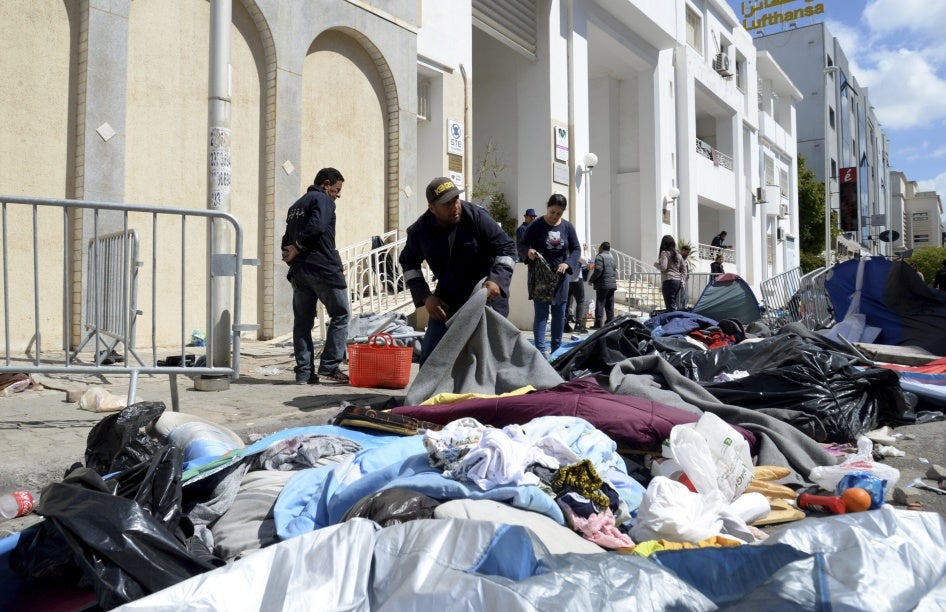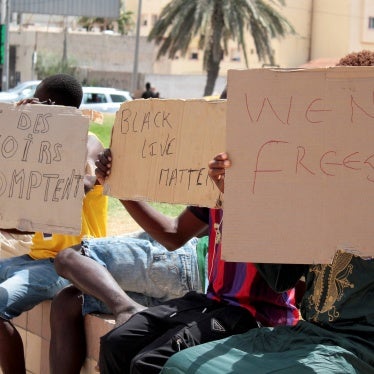Update May 17, 2024: On May 16, Saadia Mosbah and at least two people connected to Terre d'Asile Tunisie (Land of Asylum Tunisia) appeared before a judge and were placed in pretrial detention.
Between May 3 and 13, 2024, security forces arrested two prominent lawyers and two well-known journalists, as well as at least five members of at least three legally registered nongovernmental organizations working on migration, asylum, and racial justice: Mnemty, the Tunisian Refugee Council, and Terre d’Asile Tunisie. In total, members of at least eight nongovernmental organizations have been investigated or summoned.
“The clampdown on migration-related work at the same time as the increasing arrest of government critics and journalists sends a chilling message that anyone who doesn't fall in line may end up in the authorities’ crosshairs,” said Lama Fakih, Middle East and North Africa director at Human Rights Watch. “By targeting these civil society groups, Tunisian authorities jeopardize the vital support they provide migrants, refugees, and asylum seekers living in extremely vulnerable situations.”
On May 11, security officers stormed the Tunisian Bar Association’s headquarters during a live television broadcast, arresting a media commentator and lawyer, Sonia Dahmani, for sarcastic comments made on May 7 questioning the claim that Black African migrants were seeking to settle in Tunisia. Based on media reports, Dahmani’s arrest and subsequent detention was based on Decree-Law 54 on cybercrime, which imposes heavy prison sentences for spreading “fake news” and “rumors” online and in the media, after she refused to respond to a summons for questioning.
The same evening, authorities also arrested two other journalists and colleagues of Dahmani—Mourad Zeghidi and Borhen Bsaies—in connection with unrelated statements made in the media and online, also under Decree-Law 54. They have been placed in pretrial detention pending trial on April 22.
On May 13, security officers arrested Mehdi Zagrouba, a lawyer and government critic. Tunisia’s Interior Ministry said in a statement that Zagrouba was arrested because he had assaulted police officers that day near a Tunis court. On May 15, Tunisian President Kais Saied said in a statement that “those who dare to denigrate their country in the media and who violently assaulted police officers ... cannot remain unaccountable,” in indirect reference to Dahmani and Zagrouba.
Security forces arrested Saadia Mosbah, the head of the anti-racism organization Mnemty (My Dream), and Zied Rouin, the organization's program coordinator, on May 6. They also searched Mosbah’s home and the group’s offices, confiscating devices and documents. While Rouin was released after questioning, a public prosecutor placed Mosbah in custody for 10 days as part of an investigation into alleged financial crimes under Tunisia’s 2015 counterterrorism law. A person close to the case told Human Rights Watch that security forces questioned Mosbah about Mnemty’s funding and activities.
Mosbah is a prominent Black Tunisian activist and a pioneer in the fight against racism in Tunisia who contributed to the adoption in 2018 of a landmark law for the elimination of all forms of racial discrimination. Pro-government social media accounts engaged in an aggressive online smear campaign against Mosbah that gained traction days before her arrest, Human Rights Watch said.
The same day as Mosbah’s arrest, Saied said that foreign funding was being funneled to national organizations to settle migrants in Tunisia illegally and referred to the heads of the organizations as “traitors.” He also confirmed that Tunisian authorities were expelling migrants to border areas in “continued cooperation” with neighboring countries. On May 3 and 4, security forces raided at least two makeshift camps and a youth hostel in Tunis and evicted hundreds of Black African migrants, refugees, and asylum seekers. At least 80 of them were arrested and 400 were expelled to the country’s borders, according to the authorities. These constitute unlawful collective expulsions, which are prohibited by the African Charter on Human and Peoples’ Rights, Human Rights Watch said.
Saied's comments strongly echoed his February 2023 speech, which led to a surge in attacks and abuses by both Tunisian citizens and security forces against Black Africans in Tunisia. At the time, the UN Committee on the Elimination of Racial Discrimination called Saied’s speech racist and considered that such remarks violate the International Convention on the Elimination of All Forms of Racial Discrimination, to which Tunisia is a state party.
On May 7, a court spokesperson told the national news agency that the president and vice president of a civil society group had been detained that day on suspicion of embezzlement and financial misconduct. Though they were not named, Human Rights Watch confirmed that these remarks were in reference to the president and vice president of the Tunisian Refugee Council (Conseil Tunisien pour les Réfugiés, CTR).
Based on the spokesperson’s comments to the media, the public prosecutor’s office accused the heads of the CTR of “forming a criminal association with the aim of helping people to enter Tunisia” illegally in connection with a “call for tenders to Tunisian hotel establishments for the accommodation of African migrants” that their organization published “without coordination with the security and administrative authorities,” referring to its work with the United Nations High Commissioner for Refugees (UNHCR).
The CTR was formed in 2016 and has been a key partner of the UNHCR in Tunisia, being primarily responsible for the collection and initial screening of asylum applications, which are subsequently processed by UNHCR.
The CTR also provides other services to support the UNHCR’s mandate, such as arranging emergency accommodation and medical assistance for refugees and asylum seekers. On May 2, it published a public tender for Tunisian hotels to provide services for the CTR’s beneficiaries, sparking a backlash on social media and among parliament members.
The court spokesperson also said that another group supporting asylum seekers and refugees in Tunisia was also being investigated. Sources told Human Rights Watch that the spokesperson was referring to Terre d’Asile Tunisie (Land of Asylum Tunisia), and that at least two people linked to the organization had been arrested on May 8.
The Tunisian police, military, and National Guard, including the Coast Guard, have committed serious abuses against Black African migrants, refugees, and asylum seekers in recent years, with abuses increasing since 2023. Human Rights Watch has documented beatings, use of excessive force, some cases of torture, arbitrary arrests and detention, collective expulsions, dangerous actions at sea during boat interceptions, forced evictions, and the theft of money and belongings.
As of April 30, over 17,000 refugees and asylum seekers were registered with the UNHCR in Tunisia. Over 7,000 are Sudanese, including many who have fled Sudan’s conflict since April 2023.
On May 15, the European Union and France issued statements expressing concern over the recent arrests of civil society representatives in Tunisia. The EU said its delegation in the country had made inquiries to the authorities about the reasons for the arrests. Saied indirectly referred to these statements later that day, saying they were an unacceptable foreign intervention.
On July 16, 2023, the EU signed a Memorandum of Understanding with Tunisia that included a funding package of up to €1 billion, including €105 million to curb irregular migration, without any specific human rights guarantees for migrants and asylum seekers.
The EU Commission should ensure that no EU funding is disbursed to governmental entities that commit human rights abuses against migrants or asylum seekers, and they should tie future migration cooperation with Tunisia to genuine guarantees that civil society groups working on migrant and refugee rights can perform their activities without fear of harassment or reprisal.
According to the Tunisian government, a draft law on associations is currently being finalized by the Tunisian Justice Ministry. Leaked drafts since 2022 suggest that the government may give the administration overly broad powers and discretion to interfere with the way civil society organizations are formed, their functions and operations, and their funding. Human Rights Watch has previously expressed concerns about another draft law on associations.
Since July 25, 2021, Saied has dismantled Tunisia’s democratic institutions, undermined judicial independence, and stifled the exercise of freedom of expression and the press, Human Rights Watch said. Tunisia’s international partners should press the government to drop the plan to adopt the draft law on civil society organizations, which if passed would undermine freedom of association in the country.
“Targeting nongovernmental groups supporting migrants, asylum seekers, and refugees is part of a broader effort to dismantle Tunisia's civic space,” Fakih said. “The EU, which has pledged millions to Tunisia on migration cooperation, should ensure that the authorities protect space for independent civil society to work on these issues in the country.”









